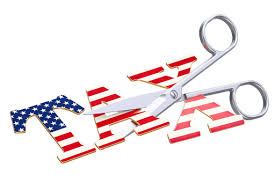
According to survey by the National Association of Business Economics’ (NABE) for the United States for its quarterly business conditions gas revealed that there has apparently been no significant impact on the capital investments or the hiring plans of companies in the US despite the $1.5 trillion cut tax package announced the US president Donald Trump. The results of the poll was made public after about a year since the Trump administration had announced the largest overhaul in 30 years in the U.S. tax code.
There were some companies that were surveyed which confirmed that they had sped up investments taking advantage of the lower rates of US corporate taxes, the NABE quarterly business conditions poll published on Monday found that 84 per cent of respondents had made no alterations in their investment or hiring plans. In comparison in October last year, that number was at 81 per cent.
According to the expectations of the White House when it had announced the fiscal stimulus package for the corporate that reduced the effective tax rates for corporate in the US to 21 per cent from 35 per cent, was that this would spur companies to increase business spending and would thereby result in more jobs in the US economy. The reduced tax rates became applicable in January 2018.
“A large majority of respondents, 84 percent, indicate that one year after its passage, the corporate tax reform has not caused their firms to change hiring or investment plans,” said NABE President Kevin Swift.
The goods producing sector however has had an impact because of the lowering of the tax rates. About half of the respondents of the survey belonging to that sector had said that investments in their companies had been increased while 20 per cent of them opined that hiring and investments that they were doing abroad were redirected to the US.
Following a moderate increase in the third quarter of 2018, a further slowdown in business spending later on was suggested by the NABE survey. The capital expenditure in the US in January this year dropped to the lowest since July of 2017, according to the survey’s measure of capital spending.
“Fewer firms increased capital spending compared to the October survey responses, but the cutback appeared to be concentrated more in structures than in information and communication technology investments,” said Swift, who is also chief economist at the American Chemistry Council.
Compared to the third quarter of 2018, there was a moderate growth in employment in the fourth quarter of 2018, according to the survey. Over the past three months, an increase in the employment in their companies was reported by just over a third of the respondents. That was a bit more than the 31 per cent in the October survey. Compared to 29 in October, the forward-looking measure of employment dropped to 25 in January according to the survey.
(Source:www.wallstreetreporter.com)
There were some companies that were surveyed which confirmed that they had sped up investments taking advantage of the lower rates of US corporate taxes, the NABE quarterly business conditions poll published on Monday found that 84 per cent of respondents had made no alterations in their investment or hiring plans. In comparison in October last year, that number was at 81 per cent.
According to the expectations of the White House when it had announced the fiscal stimulus package for the corporate that reduced the effective tax rates for corporate in the US to 21 per cent from 35 per cent, was that this would spur companies to increase business spending and would thereby result in more jobs in the US economy. The reduced tax rates became applicable in January 2018.
“A large majority of respondents, 84 percent, indicate that one year after its passage, the corporate tax reform has not caused their firms to change hiring or investment plans,” said NABE President Kevin Swift.
The goods producing sector however has had an impact because of the lowering of the tax rates. About half of the respondents of the survey belonging to that sector had said that investments in their companies had been increased while 20 per cent of them opined that hiring and investments that they were doing abroad were redirected to the US.
Following a moderate increase in the third quarter of 2018, a further slowdown in business spending later on was suggested by the NABE survey. The capital expenditure in the US in January this year dropped to the lowest since July of 2017, according to the survey’s measure of capital spending.
“Fewer firms increased capital spending compared to the October survey responses, but the cutback appeared to be concentrated more in structures than in information and communication technology investments,” said Swift, who is also chief economist at the American Chemistry Council.
Compared to the third quarter of 2018, there was a moderate growth in employment in the fourth quarter of 2018, according to the survey. Over the past three months, an increase in the employment in their companies was reported by just over a third of the respondents. That was a bit more than the 31 per cent in the October survey. Compared to 29 in October, the forward-looking measure of employment dropped to 25 in January according to the survey.
(Source:www.wallstreetreporter.com)





